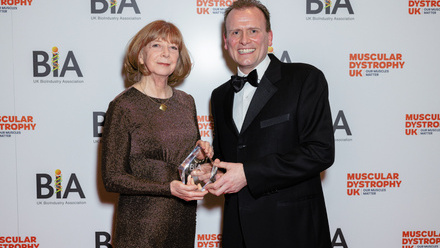A skills-first approach to the mRNA revolution

In this interview, Abby Clark, the BIA's Manufacturing Programme Manager, shares her personal journey from completing a degree-level apprenticeship in biotech at CPI - where she focused on continuous processing and mRNA downstream development - to stepping into a key role at the BIA, leading on medicine manufacturing policy. Her story highlights how hands-on experience and early exposure to cutting-edge technologies, like mRNA, provide a unique edge in a rapidly evolving industry.
The UK's life sciences sector is at a pivotal moment, with groundbreaking innovations like mRNA technology transforming medicine. While scientific discovery often captures the headlines, the journey from lab to patient relies on a highly skilled workforce, and apprenticeships are a crucial pipeline for this talent.
Why did you choose an apprenticeship route when starting your career in biotech?
From a young age, I’ve always been career-driven. I started working in a bar and restaurant at just 13, often prioritising my job over schoolwork. I knew this pattern would continue into university, so when I discovered the apprenticeship route, it felt like the perfect fit. It allowed me to gain hands-on experience while earning my degree, a win-win.
Traditional exams had never been my strong suit (possibly due to late-night shifts prior), and I’ve always been more of a visual learner. I absorb knowledge best by watching and working alongside others, so the standard textbook approach never quite suited me.
My decision to pursue an apprenticeship in the biotech sector came from a genuine love of science, nurtured through school and sixth form. At the time, I had no direct exposure to the industry and was torn between following a career in biomedical science (the standard university route) or biotech (apprenticeship route). My sixth form at the time didn’t push the top-level sets towards apprenticeships; therefore, a biomedical science degree was made to feel like the normal path to take. Fortunately, I was offered the apprenticeship, which turned out to be an opportunity that has shaped my career path and opened doors I never imagined.
What was the most significant benefit you gained from your apprenticeship that you wouldn't have otherwise?
Working within industry gave me the invaluable opportunity to build a strong network of professionals to learn from. Having a network isn’t just about connections; it’s about gaining advice, exploring potential career paths, and understanding the wider sector beyond your own role or organisation.
One of the biggest advantages of an apprenticeship is access to mentors. Unlike the traditional university route, where guidance can feel limited, I had experienced professionals supporting me through the most formative years of my career. Having a mentor to help me navigate challenges, build confidence, and set ambitious goals has been instrumental, not just in my early career but as I continue to grow in the industry.
How did your apprenticeship give you a unique edge or perspective in the biotech industry?
I was completing my apprenticeship during the COVID-19 pandemic, at a time when CPI were expanding into mRNA therapeutics. I gained early exposure to a technology that has since transformed the biotech landscape, positioning me with knowledge and experience at the forefront of the sector.
This foundation not only shaped my understanding of emerging science but also gave me the confidence to embrace future innovations, adapt to evolving industry needs, and influence my current role in policy development, helping to drive the sector forward and support its continued growth.
From your hands-on experience as an apprentice, how does that background now influence your work in policy at BIA?
Hands-on experience has largely impacted my policy work at the BIA. I can apply the challenges and opportunities I saw within the sector to medicine manufacturing policy development. Already having a large network of stakeholders helped me in the transition from lab to trade association.
What's the one piece of advice you'd give to someone considering a biotech apprenticeship?
I would say get as much experience as you can and listen to those around you. Don’t turn down opportunities where possible as you may regret it at some point in your career. Build meaningful relationships through networking and make friends during your apprenticeship to help support your transition from sixth form to industry!
Conclusion
Abby's story is a powerful example of how apprenticeships can accelerate career growth and shape the future of the UK's biotech sector. Her experience at the forefront of mRNA development during the pandemic and her subsequent transition into a policy role at the BIA demonstrate the immense value of practical, industry-led training. By fostering a new generation of skilled professionals, initiatives like the Advanced Therapies Apprenticeship Community (ATAC) are not only building a pipeline of talent but also strengthening the entire ecosystem.
If Abby's story has inspired you and you are interested in this field, look at BIA's mRNA Revolution explainer. It outlines and explores that ecosystem in detail, and Abby's journey provides a living case study of the kind of expertise that will drive the UK to become a global leader in mRNA-based medicines.






